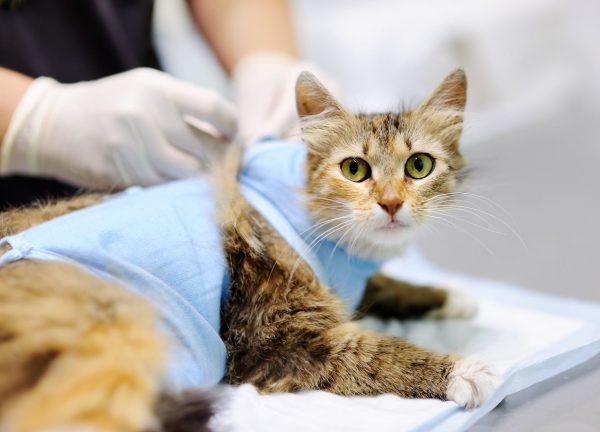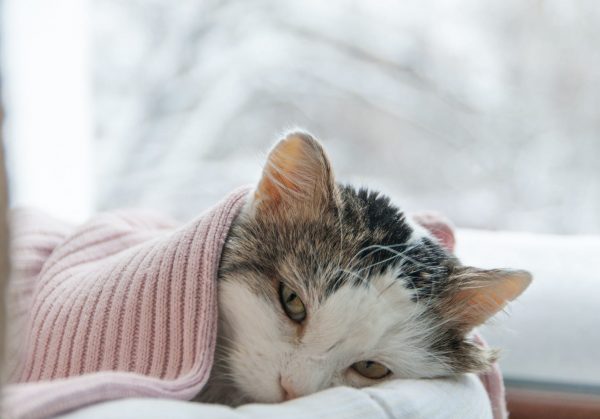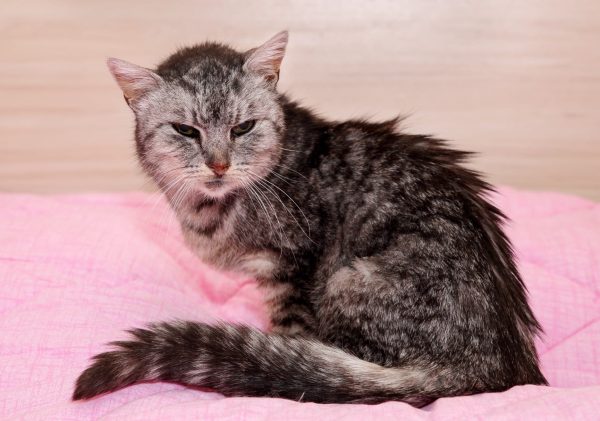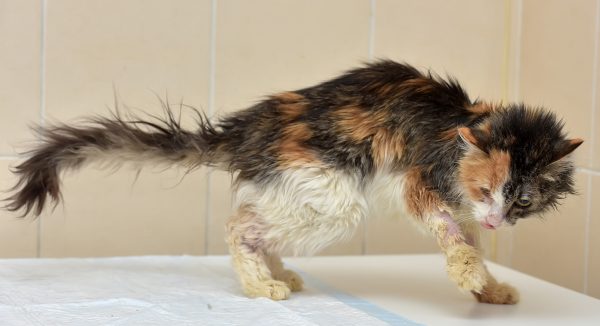Cat Cancer Signs and Symptoms
In any human or animal, “cancer” is a word one hopes to never hear. While cancer in cats is not as common as it is in dogs, it still occurs at a frequent rate with 1 in every 5 cats being diagnosed with lymphomas and tumors.
Cancer is, essentially, when cells begin abnormally dividing and multiplying in the body in a chaotic manner. This condition may be localized to one area or it may metastasize and spread to other parts of the body.
Metastasis in cancer is aggressive, nearly impossible to stop, and even harder to treat since it affects many different body parts.
Cancer in cats can be elusive. It is normally not accompanied by any blatant symptoms. This, unfortunately, can make cancer hard to detect, especially in the early stages. Even though there are some symptoms, they are quite vague and can be easily overlooked as a less serious condition.
How Do Cats Get Cancer?
As for causation, there is no definitive cause of cancer in cats. Yet some people point to feline leukemia virus (FeLV) or harmful substances that subsist in the environment as potential causes.
While the exact cause is unknown, many vets point to genetics to determine whether a cat is predisposed to a specific type of cancer. If cancer prevalence can be tracked in the cat’s family, there is a better chance of being able to anticipate what forms of cancer that cat may see during its lifetime.
While several common and rare types of cancer in cats exist, there are three types that are seen more than the rest.
 3 Most Common Types of Lymphoma
3 Most Common Types of Lymphoma
Lymphoma is cancer that afflicts the white blood cells in the body. Within the lymph nodes, normally occurring lymphocytes (white blood cells) begin to multiply uncontrollably. This drastically weakens the immune system.
White blood cells are responsible for maintaining the body’s ability to fight off infection. Naturally, when these cells are compromised, it can be detrimental to the cat’s health overall.
Below are the 3 types of lymphoma that cats are regularly diagnosed with:
- Intestinal type:
Also known as alimentary lymphoma, this affects the digestive tract of the cat. As the most common type of lymphoma, the intestinal form is often seen in elderly cats. As a low-grade lymphoma, chemotherapy is often administered orally. Prednisolone and chlorambucil are common therapies that are used in the treatment of this type.
- Multicentric type:
This form of lymphoma affects many organs and part of the lymphatic system. Furthermore, studies have been able to closely link this type to a feline leukemia diagnosis.
- Mediastinal type:
Frequently observed deep within the cavity of the chest, this type of lymphoma usually coincides with a feline leukemia diagnosis. In fact, over 80% of cats with mediastinal lymphoma test positive for FeLV.
When chemotherapy is used to aggressively treat cancer, over 75% of cats go into remission. However, steroid therapy with prednisone is also an ideal option to maintain the cat’s quality of life during treatment. Chemotherapy can ravage the body, so some owners opt for a less strenuous form of treatment.
While the prognosis tends to be poor for cats with lymphoma, treatments to enhance the quality of life can keep the cat alive for much longer than intended.
Soft-Tissue Carcinoma
More commonly referred to as fibrosarcoma or feline injection-site sarcoma (FISS), soft-tissue carcinomas originate in the fibers of connective tissue in the body. Though it is quite rare, this form of cancer is primarily caused by an injection of one of the following:
- Insulin
- Antibiotics
- Vaccines
- Steroids
Depending upon where the injection is made, this can sometimes cause issues in the cell fibers or muscles which then may develop into fibrosarcomas. Treatment for this cancer involves intensive surgery, which may or may not be accompanied by chemotherapy.
 Squamous Cell Carcinoma
Squamous Cell Carcinoma
This type of cancer originates in the cat’s skin cells. Sometimes referred to as SCC, this cancer can develop from excessive exposure of the mouth, ears, and nose to the sun. Therefore, this cancer is most often seen in climates that have mostly sunny days.
The best way to avoid a diagnosis of SCC is to keep the cat inside as much as possible. Although this cancer can be hard to treat, it is preventable. Prognosis is always best when it is caught early.
Cat Cancer Prognosis
The prognosis of cat cancer cannot be accurately determined without taking into account several factors. The type of cancer, how advanced it is, and whether or not it has metastasized are all factors that can signal a good or bad prognosis.
Without a doubt, the earlier the cancer is caught in progression, the better. If the cancer has not progressed much, it may be easily treated with a few rounds of chemotherapy.
Depending upon how aggressive the type of cancer is, the average survival rate for cats is around 50% overall.
Cat Cancer Treatment
Given the encouraging and viable forms of treatment now available to cats with cancer, the option of putting the cat down should never be considered as the go-to choice.
The course of treatment chosen by the vet will be based on what form of cancer the cat is dealing with and how far along it is in progression. If the cancer is metastasizing, this added element will greatly affect how the treatment is approached.
 Approaches to Feline Cancer Treatment
Approaches to Feline Cancer Treatment
Malignant lumps under the skin and soft-tissue carcinomas are often removed surgically. Chemotherapy may precede or follow surgery to eliminate cancerous cells.
Rounds of chemotherapy or Prednisolone are often used for lymphomas and other metastasizing forms of cancer. On the other hand, radiation is used for cancers that are hard to physically remove, such as cancerous tumors.
The main goal of treatment for cancer in felines is for cancer to go into remission. A treatment that is most beneficial to the cat’s quality of life is always first and foremost.
Fortunately, there is hope for feline cancer. In a few short decades, there have been many great advances in methods of treatment that have proved to be effective, long-lasting, and more comfortable for the cat to go through.
 Cat Cancer Supplements
Cat Cancer Supplements
Some cat lovers swear by natural supplements to help keep their cats alive and well for as long as possible. Here are some of the recommendations, although we cannot prescribe or make any claims about their success.
- ES Clear for Cats: This is a natural treatment for cancer in cats that may work to support its immune system and facilitate the healing process in a holistic approach. This treatment may target all the parts of the body afflicted with cancer, thereby reducing discomfort and adverse symptoms.
- Life Gold Cat Cancer Support: This supplement may extend the quality of life for cats battling cancer through the facilitation of antioxidant and immune system functioning. This product may also work to eliminate free radicals.
- SPARK Daily Nutritional Supplement: Though this product is solely meant to supplement cancer treatment, it has been shown to do so. Filled with super greens, this supplement may improve digestion, energy levels, and more.
It is crucial to speak with the cat’s vet before administering any over-the-counter supplements for cancer. It is important to ensure the supplements will not interfere with any other treatment endeavors. Additional cat health concerns will be added to our site each month.
Although cancer in cats is a very scary experience for owners and cats alike, treatment is available and there is hope for healing and restoration of the cat’s quality of life.




 3 Most Common Types of Lymphoma
3 Most Common Types of Lymphoma Squamous Cell Carcinoma
Squamous Cell Carcinoma